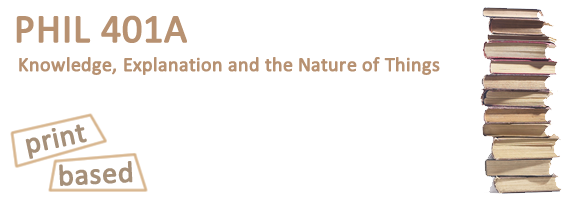
Mode of Delivery
This is a print-based, correspondence course.
Course Outline
- Four assignments
- Final examination
Course Description
Some influential philosophical writings and doctrines as an introduction to the problems and methods of Philosophy. Credit may not be obtained for both Philosophy 100 and Philosophy 400A and 401A if taken by correspondence.
Every effort has been made to make the course both interesting and readily understandable. The texts have been selected with these aims in mind, and the course manual gives ample help with the readings. The essay questions have also been chosen with an eye to what students find intellectually exciting, and the manual provides advice on how to go about writing a philosophical essay. No previous contact with philosophy is presupposed: the course begins at the beginning and takes nothing for granted except a willingness to be exposed to the charms of philosophy.
Course Overview
Plato claimed that philosophy begins in wonder and ends in wisdom. It is arguable that Plato was overly-optimistic about where philosophy ends, but there can be no serious doubt that puzzlement is the authentic impulse to philosophize. The aim of this course is to introduce you to that impulse: to show how easy it is for puzzling philosophical questions to arise, to show how one can fruitfully explore such questions, and, we hope, to capture for you some of the intellectual excitement that can come from doing philosophy.
Course Content
The course begins in Lesson One with an account of the kinds of issues that philosophers deal with, and what makes those issues distinctly philosophical. We will then, after having acquainted ourselves with some basic logic in Lesson Two, turn to the lessons which contain the main content of the course. Each of these lessons deals with a main question of philosophy, and has a double function. The first is to provide you with some idea of the branch of philosophy to which those problems fall, together with an introduction to some of the main thinkers in that field. The second — and more important — objective is to get you to consider, in some detail, one of those problems. The course manual, together with other assigned texts will be your guides here. Lesson Three will provide a basic introduction to the chief questions of epistemology:
- what is knowledge?
- what can we know? and
- how do we know what we do?
Our primary concern in this lesson will be to take a belief we all hold, viz., that there is an external world, and ask what justification can be provided for it. In Lesson Four, we will tackle one of the leading problems of metaphysics, the so-called Mind-Body Problem. Finally, in Lesson Five, we will take up a question which lies at the intersection of epistemology and metaphysics, the question of justifying making claims about unobserved events or objects on the basis of observed events or objects. Our stalking horse here will be the question: How do we know the sun will rise tomorrow? You will be asked to do one logic assignment, three essays, and a final examination. Working at a reasonable pace, you should be able to complete the course in six to eight months.
Evaluation
Your final mark out of 100 will be based on the four lesson assignments and a final examination. The assignments will be worth 20 marks each for a total of 80, and the final exam will be worth 20 marks.
|
Four assignments
@ 20 marks each |
80
|
| Final Exam |
20
|
|
Total
|
100
|
Textbooks/Course Materials
- Russell, B. The Problems of Philosophy. Oxford University Press, 1980.
- PHIL 401A Custom Course Materials. Reprint of Flew, A., ed. Body, Mind, and Death. Macmillan, 1964.
- PHIL 401A Custom Course Materials. Distance Education Section.
- PHIL 401A Learner Package (includes course manual).
